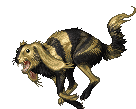Viewing 8ZxAa

Father: Unknown
Unknown Pedigree
Hardiness: 14
Appearance: 2
Emerged: 5:02 05.05.2023
Matured: 11:40 07.05.2023
Although at first glance a Dentega Salto might appear to be nothing more than a rather large lagomorph, closer inspection shows it to be in fact a surprisingly vicious predator. Venomous fangs help them subdue their prey, which ranges from grounded to airborne creatures such as Dorna Macos, Stranga Sciuros, and even Malvolva Kapos. They hunt by stalking their prey, but their true prowess is how they capture it—extreme bursts of speed combined with powerful jumps that can snatch an unwary bird right out of the air. Dentega Saltos are solitary creatures, but during their breeding season, females will gather together in maternal dens—underground, labyrinthine warrens dug by current and past generations which generally house between ten and thirty females. These dens provide protection for their kits, and females will take turns watching, feeding, and teaching them how to hunt, first with small, wounded prey brought into the den and then in the local area. Once their kits are able to fend for themselves, the females will begin to disperse back to their respective territories, leaving their offspring to venture out and survive on their own. Males serve no parental role, only interacting with females briefly around the warren, where they fight each other over mating rights; once the females have largely retreated into the warren to nest, the males depart.
The creatures that dwell in this rather desolate world still display some diversity in appearance, eating habits, and social behavior. Whether they have fur or feathers, skin or scales, their unique genetic makeup allows for a variety of colors and markings within each species. Despite limitations in food sources, herbivores, omnivores, and carnivores are all present in the food chain, and each species requires specialized care within a laboratory. Although the artificial setting of housing units and breeding pods precludes most opportunities to study true interspecific behavior, the interactions within and between species has been studied extensively in the wilderness by scientists daring enough to venture beyond the outpost’s walls.
